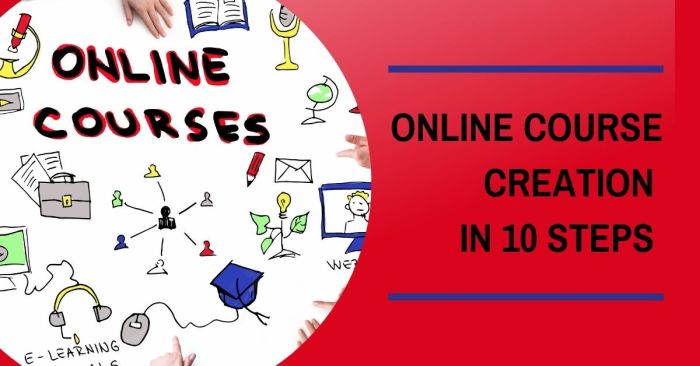Online Course Creation sparks innovation and learning in the digital age, empowering creators to engage learners and excel in online education. Dive into the dynamic world of creating captivating courses that inspire and educate.
Introduction to Online Course Creation
Creating online courses is all about developing educational content that can be accessed and completed over the internet. This allows individuals to learn at their own pace, from anywhere in the world, using various multimedia tools and resources.Online course creation offers numerous benefits, such as flexibility for both learners and instructors, scalability to reach a wider audience, and the opportunity to generate passive income.
Additionally, online courses can be updated and improved continuously, ensuring the content remains relevant and engaging.The target audience for online courses can vary widely, from students looking to supplement their education to professionals seeking to enhance their skills or individuals interested in personal development. Online courses cater to a diverse group of learners, providing accessible and convenient learning opportunities for all.
Benefits of Online Course Creation
- Flexibility in learning schedules and locations
- Scalability to reach a global audience
- Potential for passive income generation
- Continuous updates and improvements to course content
Planning Your Online Course
Planning an online course requires careful consideration to ensure its success. Here are the key steps involved in planning your online course:
Identify Course Goals and Objectives
- Define the purpose of the course and what you want your students to achieve by the end of it.
- Set clear, measurable learning objectives that Artikel the skills or knowledge students will gain.
- Align objectives with assessments to ensure they are achievable and can be measured effectively.
Importance of Setting Clear Learning Objectives
Setting clear learning objectives is crucial for the success of your online course. It helps guide the course content, assessments, and activities to ensure they are aligned with the desired outcomes. Clear learning objectives also provide students with a roadmap of what they can expect to learn and achieve, which helps keep them engaged and motivated throughout the course.
Tips for Structuring Course Content Effectively
- Organize content logically into modules or units to make it easier for students to navigate and understand.
- Use a variety of multimedia elements such as videos, images, and interactive activities to enhance engagement.
- Break down complex topics into digestible chunks to facilitate learning and retention.
- Provide clear instructions and expectations for assignments and assessments to avoid confusion.
Creating Engaging Content

Creating engaging multimedia content for online courses is essential to keeping learners interested and motivated. One way to do this is by incorporating a variety of multimedia elements such as videos, audio clips, interactive graphics, and animations to cater to different learning styles.
Use of Interactive Elements
Interactive elements like quizzes and assignments can help learners engage with the course material in a more active way. Quizzes can be used to assess understanding and reinforce key concepts, while assignments provide opportunities for hands-on application of knowledge. By incorporating these interactive elements, learners can stay engaged and track their progress throughout the course.
Strategies for Keeping Learners Motivated
To keep learners motivated throughout the course, it’s important to vary the content delivery methods and incorporate real-world examples and case studies to make the material more relatable. Providing regular feedback and opportunities for peer interaction can also help learners stay engaged and motivated to complete the course. Additionally, setting clear goals and milestones can give learners a sense of accomplishment and progress, keeping them motivated to continue learning.
Selecting an Online Course Platform
When it comes to choosing the right online course platform, it’s essential to consider various factors to ensure a seamless learning experience for your students. From user-friendly features to pricing and scalability, the platform you choose can significantly impact the success of your online course.
Comparison of Online Course Platforms
- Platform A: Known for its intuitive interface and robust analytics tools.
- Platform B: Offers a wide range of customization options for course design.
- Platform C: Integrates seamlessly with popular Learning Management Systems (LMS).
Factors to Consider
- Cost: Evaluate pricing plans and consider the scalability of the platform as your course grows.
- Features: Look for user-friendly features such as discussion boards, quizzes, and multimedia support.
- Integration: Ensure the platform can integrate with tools like email marketing software or payment gateways.
- Support: Check the level of customer support offered by the platform for troubleshooting and assistance.
Enhancing Learning Experience
- Interactive Quizzes: Incorporate quizzes to engage learners and assess their understanding of the course material.
- Discussion Forums: Create a space for students to interact, ask questions, and share insights with each other.
- Mobile Accessibility: Choose a platform that is mobile-responsive for easy access on smartphones and tablets.
Marketing and Promoting Your Online Course
When it comes to marketing and promoting your online course, it’s crucial to have a solid strategy in place to reach your target audience effectively. Utilizing various techniques and platforms can help you increase visibility and attract more students to your course.
Effective Marketing and Promotion Strategies, Online Course Creation
- Identify your target audience: Understand who your course is designed for and tailor your marketing efforts to reach them specifically.
- Create compelling content: Develop engaging promotional materials such as videos, blog posts, or infographics to capture the interest of potential students.
- Collaborate with influencers: Partnering with influencers in your niche can help you reach a wider audience and gain credibility for your course.
- Offer discounts or promotions: Providing special offers or discounts can entice more people to enroll in your course.
Importance of for Reaching a Wider Audience
, or search engine optimization, plays a crucial role in helping your online course rank higher in search engine results. By optimizing your course content with relevant s and meta tags, you can increase visibility and attract more organic traffic to your course website.
Utilizing Social Media and Email Marketing
- Social media promotion: Utilize platforms like Facebook, Instagram, Twitter, and LinkedIn to showcase your course, engage with your audience, and drive traffic to your course website.
- Email marketing campaigns: Build an email list of interested prospects and send out regular newsletters, course updates, and promotional offers to keep them engaged and informed about your course.
Feedback and Improvement: Online Course Creation

Gathering feedback from students is crucial for the success of your online course. It provides valuable insights into what is working well and what areas need improvement. Analyzing this feedback and implementing changes can greatly enhance the overall quality of your course.
Importance of Gathering Feedback
- Allows you to understand the needs and preferences of your students.
- Identifies areas of your course that may be confusing or unclear.
- Helps in improving student engagement and satisfaction.
Analyzing Feedback and Making Improvements
- Review feedback regularly and look for common themes or patterns.
- Prioritize areas that have the most significant impact on student learning.
- Implement changes based on feedback and track the results.
Continuous Improvement for Course Enhancement
- Regularly update content to keep it relevant and up-to-date.
- Seek feedback from new students to ensure ongoing improvements.
- Embrace a growth mindset and be open to making changes for the betterment of your course.